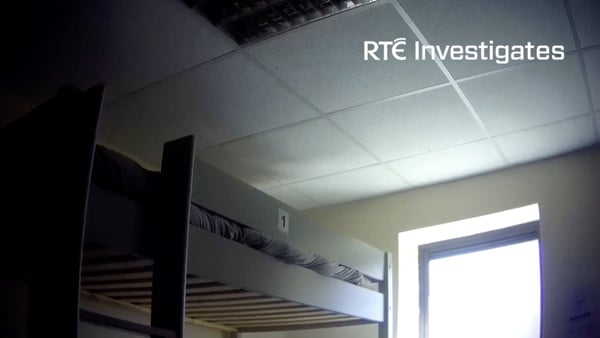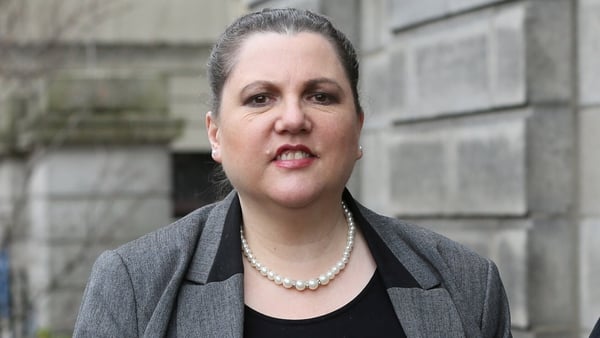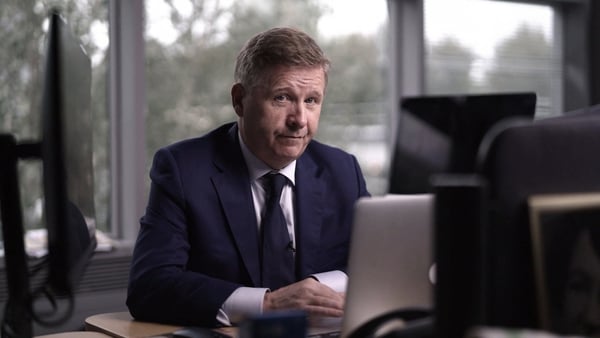Long Covid can leave people struggling with perplexing and debilitating symptoms, such as chronic fatigue, joint pain and memory loss. Those affected are crying out for help.
Linda Dalton stared blankly at her screen. She was trying to tell her story in a video diary, a story that's consumed her life for the past year.
But she couldn't remember what she was talking about.
Not for the first time, Linda had a memory lapse.
It’s one of the 200 potential symptoms associated with the lingering effects of Covid, a condition known as Long Covid.
Linda, 46, has been suffering with Long Covid since she had a relatively mild experience with Covid back in October.
"Some days I can’t remember simple things," she told RTÉ Investigates.
"I forget what I’ve just said a few minutes earlier, what month it is, even my daughter’s name."
But the worst symptoms for Linda are chronic fatigue and crippling pain in her joints and upper chest.
As many as one in ten people who get the virus go on to suffer from Long Covid. The symptoms and severity of the condition can vary.
Up until last year, Linda was a keen cyclist, a swimmer and a black belt in Taekwondo. But Long Covid has left her struggling to walk. In a video diary recording her experience back in February, Linda was clearly gasping for breath as she described the effects of Long Covid.
We need your consent to load this comcast-player contentWe use comcast-player to manage extra content that can set cookies on your device and collect data about your activity. Please review their details and accept them to load the content.Manage Preferences
"I am taking morphine three times a day, but it is not working. I’m just pushing through the pain here," she said.
"My legs feel like 100 stone each. But I have to keep going. I can’t sit in bed and just give up. But I don’t know what to do."
Linda is one of a number of people with Long Covid who recorded their experiences for RTÉ Investigates. For each of them, their journey through the healthcare system has been a bruising experience.
The delivery of Long Covid services is not centralised and, for some patients, the quality of services can depend on where they live.
This postcode lottery means that Linda must travel almost 100 miles from her home in south Kilkenny to access services in Dublin.
Back in February, she was still waiting to be seen by a neurologist and a clinical disease specialist. "I need help. Please help," she pleaded.
Linda has since been seen by a clinical disease specialist. But, just last week, she was still waiting to see a neurologist.
Her condition appears to have worsened and she walked with the assistance of her husband Graham.
"I feel so old," she said. "I feel so useless."
There is still no cure for Long Covid. Studies indicate that it may be triggered by an auto-immune response to a Covid infection.
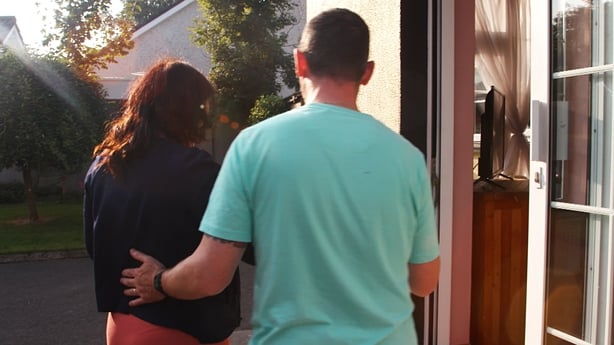
Many organs in the body are potentially vulnerable to the condition, so patients often require multi-disciplinary support, which is not currently available in many parts of the country, particularly outside Dublin.
However, this could soon change. RTÉ Investigates understands that the HSE plans to set up new hubs across the country to treat Long Covid.
The hubs will have access to multi-disciplinary support in each of the eight national hospital groups, according to Eoghan DeBarra, consultant and lecturer with the Royal College of Surgeons in Ireland.
Asked about the plan, a HSE spokesperson said: "A national approach to post Covid or long Covid has been developed and the HSE are currently recruiting for the position of an Implementation Lead for a Long Covid Care Model."
But for now, many patients have to battle to access a patchwork of services. "The service is totally insufficient," said Aidan O’Brien, of the Irish Thoracic Society, which represents respiratory consultants.
There is also limited public health information available about Long Covid. Linda Dalton has had to learn some of her coping strategies the hard way.
She now realises that she must limit her physical activity - even when she has bouts of energy.
"If I do too much, simple things like taking a long walk," she told RTÉ Investigates, "I will be floored afterwards and I will have to go to bed."
This is a familiar experience for many people with Long Covid.
"It is called post-exertion malaise. People with Long Covid can have relapses when they over-do things - what would normally be simple tasks," said Claire Twomey, spokesperson for the 2,000-member Facebook campaign group, Long Covid Cases Ireland.
"But this is information we have had to find out ourselves. There is no guidance from the HSE, there is very little information on their website about Long Covid."
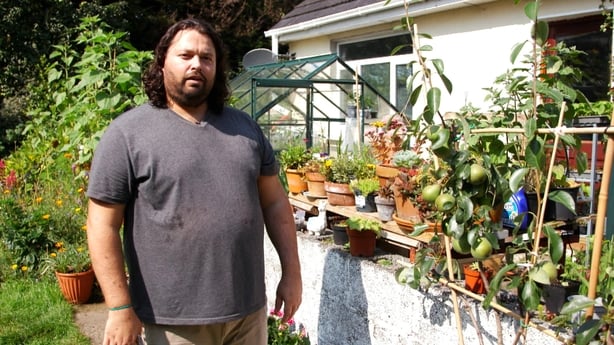
"There is no guidance for GPs, there is no national programme rolled out yet and the waiting lists are extremely long."
Asked about services for people with Long Covid, a HSE spokesperson told RTÉ Investigates that there were "a range of supports available in general practice and in the hospital setting".
They said that the HSE was working on "further developing those supports".
"Treatment is currently focused on management of specific symptoms."
Some of the symptoms of Long Covid can be perplexing. After he contracted Long Covid in March last year, Eugene Van As lost the power in his left hand. He is a big, broad-shouldered man, over 6ft tall.
But in one video diary, he tried to grasp a half pound of butter. He was forced to drop it when his hand shook uncontrollably.
Eugene also suffers from shakes in his legs, blurred vision and sleep apnea, which requires him to wear an oxygen mask at night.
We need your consent to load this comcast-player contentWe use comcast-player to manage extra content that can set cookies on your device and collect data about your activity. Please review their details and accept them to load the content.Manage Preferences
It has taken Eugene over a year to access a specialist service in Blanchardstown in west Dublin, where he is now on a pathway to see a variety of specialists in November.
When Eugene spoke to RTÉ Investigates again last week, he showed little improvement since he started recording his diaries seven months ago.
He struggled to hold a small plant pot in his left hand, and a short five-minute walk in his garden left him exhausted and breathless.
"It is really frustrating to have to wait so long to find out what is going on in your body," he said.
In west Cork, while Shana Cashen, 39, is waiting to be seen by a specialist, she occasionally suffers from fainting spells.
"I can’t be the parent I was," Shana, a mother of five, told RTÉ Investigates.
"I just pass out if my blood pressures goes too low. I passed out on the stairs a few months ago and woke up with my two-year-old stroking my head and she was saying mummy wake up."
The frustration of dealing with the symptoms of Long Covid and lack of clear pathways to care can take a toll on the mental health of some sufferers.
Rachael Dandy was evidently struggling with her mental health when she was recording her video diary.
"The pain levels are something I’ve never experienced before," she said.
"I just need something to grasp on to - some light at the end of the tunnel. I am searching for it, but I can’t find it."
We need your consent to load this comcast-player contentWe use comcast-player to manage extra content that can set cookies on your device and collect data about your activity. Please review their details and accept them to load the content.Manage Preferences
Rachael, 40, a bank manager and mother of two, contracted Covid in November last year and was fortunate to get access to a Post Covid clinic after a two-month wait.
However, when she was referred to see a neurologist back in January, she was informed there was a waiting list of greater than 12 months.
When Rachael discovered this was the public waiting list, she opted to get a private appointment. However, the earliest appointment she could get was on 24 September.
A previously fit and health person, Rachael was still struggling with her symptoms she spoke to RTÉ Investigates at her home in Greystones, Co Wicklow, last week.
"Long Covid affects me in so many ways - breathlessness, chest pain, racing heart, kidney pain, inflammation, anxiety and depression," she said. "I cry a lot."
Experts say people with even mild or asymptomatic initial symptoms of Covid can go on to develop Long Covid.
However, for patients who have been in intensive care like Fred Guarin, there is a long road to recovery.
When we filmed with Fred in January of this year in Tallaght University Hospital, he was still walking with a walking aid and a supply of oxygen.
We need your consent to load this comcast-player contentWe use comcast-player to manage extra content that can set cookies on your device and collect data about your activity. Please review their details and accept them to load the content.Manage Preferences
This was three months after he had been discharged from hospital, where he had spent 51 days in ICU and almost died from Covid.
His consultant, Prof Seamus Donnelly, showed him the impact of Covid on Fred’s lungs. Pointing to an X-ray in his office, Prof Donnelly said there was a lot of scarring fibrosis on his lungs.
But there was some good news about his second lung.
"The acute inflammation will have diminished and that’s why your good lung is coming back and you’ll be able to do more," he said.
"Because you were in ICU so long, you got critical care syndrome - so you got Covid very bad and then you got critical care syndrome, which affected your muscles and your nerves particularly your arms and legs - it's slow but you're improving every time I see you which is very good."
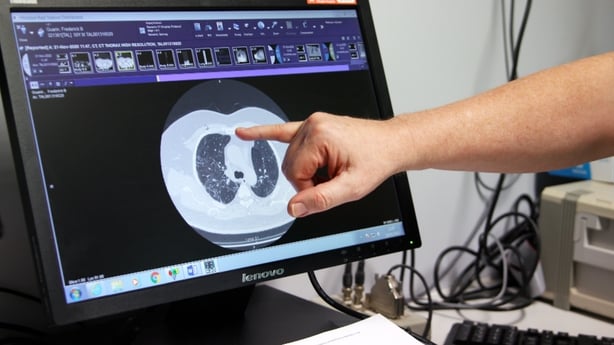
Fred was fortunate to be a patient in Tallaght University Hospital, which funds one of the few multi-disciplinary Post Covid services in the country. His recovery since then has been slow but steady, according to Prof Donnelly.
At his home in Saggart, Co Dublin, last week, Fred was able to walk around his apartment unaided.
However, a short walk across the room to water his plants left him breathless, and he had to sit down.
He still requires a walking aid and a supply of oxygen to walk outside his home.
Fred is improving but he knows the science around Long Covid is still evolving and his future is uncertain.
"It’s a scary thing," he told RTÉ Investigates.
"I don’t know whether I will be back the way I am or not. Your future is kind of a blur. You don’t know what your future will be with Long Covid. When will it stop?"


